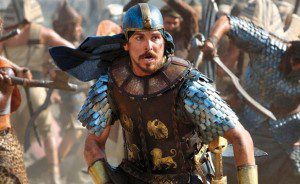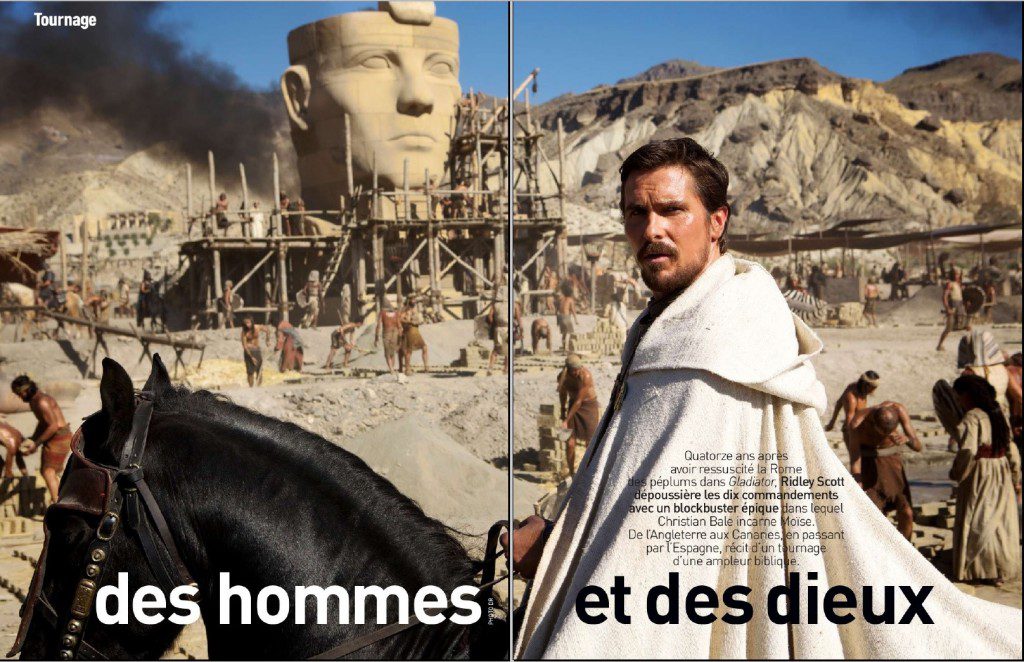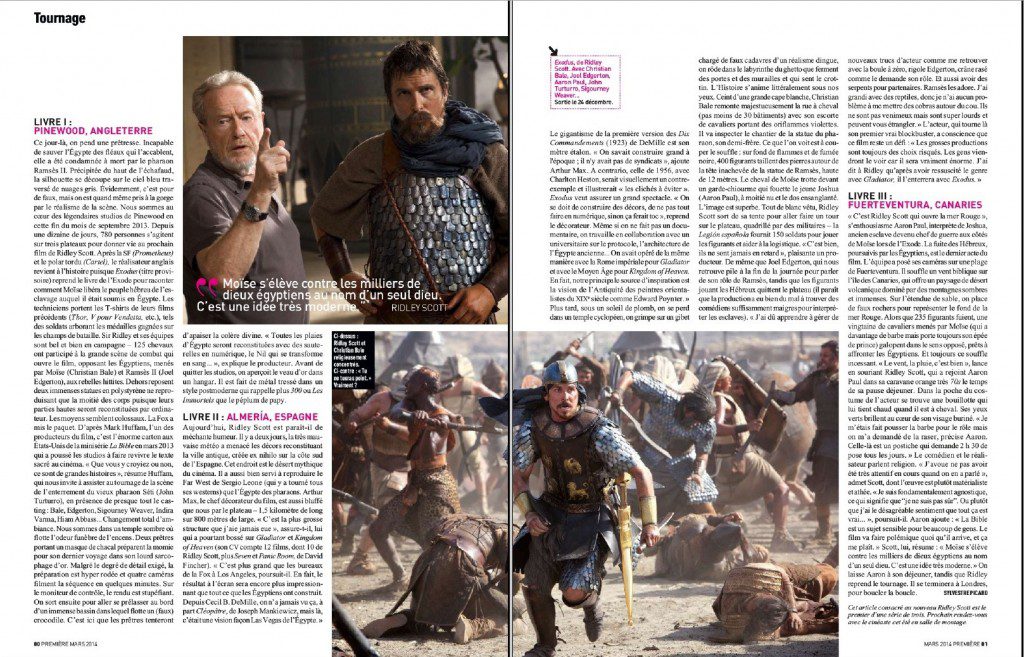 There’s a new article about Ridley Scott’s Exodus in Première magazine, and it has some interesting new details about the film and the way Scott, an agnostic, is approaching the story of Moses. My French is a little rusty, but with a little help from Google Translate, I was able to glean this much from the article:
There’s a new article about Ridley Scott’s Exodus in Première magazine, and it has some interesting new details about the film and the way Scott, an agnostic, is approaching the story of Moses. My French is a little rusty, but with a little help from Google Translate, I was able to glean this much from the article:
- “Exodus” is apparently just a working title right now.
- The Spanish Legion provided 150 soldiers to play extras and help with the logistics.
- Joel Edgerton, who plays the pharaoh Ramses, grew up with reptiles and says he has no problem working with snakes or putting cobras around his neck.
- A great battle between Egyptians and rebel Hittites opens the film, and Moses and Ramses are leading the Egyptians together in that scene. (Historically, the ongoing conflict between the Egyptians and the Hittites came to a head with the Battle of Kadesh, which was fought in Syria about five years into Ramses’ 66-year reign, and which led to one of the earliest known peace treaties.)
- “Almost the entire cast” was present for a scene depicting the burial of Seti, the pharaoh played by John Turturro. This includes Christian Bale, who plays Moses. It’s not clear whether Bale was actually “in character” at the time or simply visiting the set, but most Moses movies — from The Ten Commandments (1956) to The Prince of Egypt (1998) — have followed the Bible’s lead by having the earlier pharaoh’s death, and the later pharaoh’s ascension to the throne, take place while Moses is in exile, living with Jethro and his family.
- Moses will inspect the construction of a statue of “the pharaoh, his half-brother.” One of the slaves being beaten as Moses arrives is the young Joshua, played by Aaron Paul. Assuming there is no mistake in the bit that I quoted — either the original report or my translation of it — it would seem that Moses is still a prince of Egypt when Ramses sits on the throne in this version of the story.
- Ramses orders the execution of a priestess by hanging when she is unable to save Egypt from the plagues.
- The parting of the Red Sea and the Hebrews’ escape from the Egyptians will form “the last act of the film,” which suggests that the film will end more or less where The Prince of Egypt did. But the reporter spotted a golden calf among the props, which suggests the film might go on to show the idolatry that the Hebrews committed shortly after the Exodus, as per The Ten Commandments.
- The Red Sea sequence will feature Moses leading 20 horsemen in a charge against the Egyptians.
- Aaron Paul says: “The Bible is a sensitive subject to many people. The film will cause a controversy when it comes out, and I like that.”
- Ridley Scott says: “Moses rises against the thousands of Egyptian gods in the name of one god. This is a very modern idea.”
That final quote from Scott plugs in nicely to that other recent quote of his, in which he indicated that Moses will have a crisis of faith early in the film.
The idea here seems to be that Moses starts out as a polytheist, has a crisis of faith, and then becomes a monotheist — though how much of his monotheism will be due to divine intervention and his Hebrew roots on the one hand, and how much of it is something that plays out on a purely personal or psychological level on the other hand, remains to be seen. (Sigmund Freud, for one, speculated that Moses got the idea for monotheism from the pharaoh Akhenaten, who reigned just a few generations before this movie takes place, and who abandoned Egyptian polytheism in favour of a religion devoted to the sun-god. Will the movie tap into any of those theories?)
In fact, given Scott’s other comments in that earlier story, about Moses questioning the idea of an afterlife etc., and given that it seems this film may take the unusual step of showing Moses at the funeral of Seti, I almost wonder if Moses’ crisis of faith will be precipitated by the death of his adoptive father. As ever, we shall see.
You can check out the original French article here:














